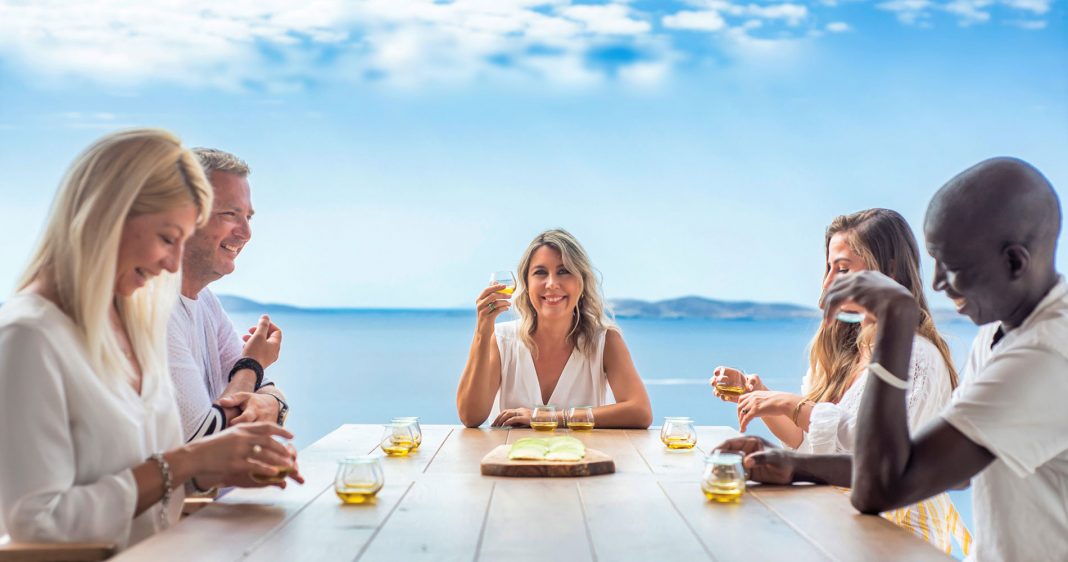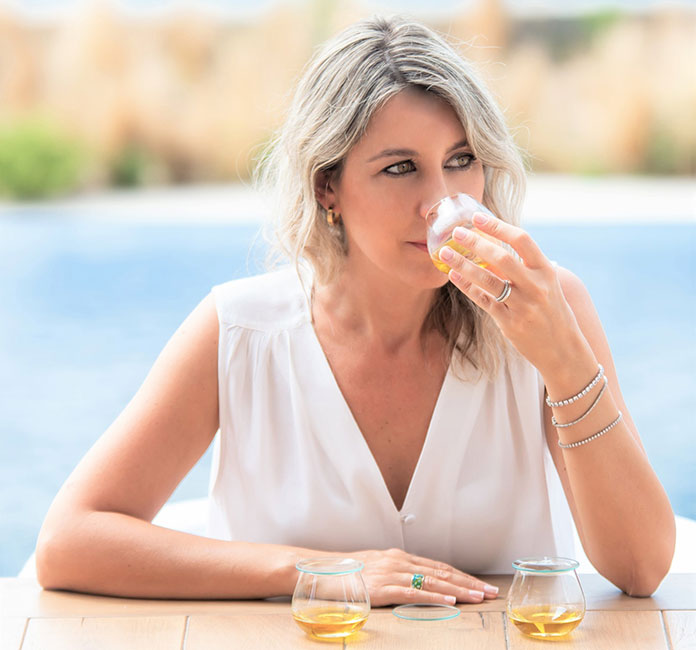Forget your average tourism experiences of the past. Anita Zachou, agronomist, expert olive oil taster by Jaen University and founder of Mykonos Olive Oil Tasting, is here to help you discover a new facet of gastro-tourism: olive oil tourism. And she shares this unique “adventure” from one of the most beautiful, intriguing, and unexpected places in Greece: the picturesque yet vibrant island of Mykonos.
Do you think that olive oil tourism –a rather new concept– has a future in Greece? Are tourists embracing it?
Olive oil tourism is the most up-and-coming and promising part of gastronomy tourism. Of course it has a bright future in Greece because the country offers all the necessary conditions for its implementation, not to mention the ideal setting. But for it to be successful, it must be organized by people with knowledge, aesthetics, offering high quality services to provide the visitor with the unforgettable experience it promises.
Olive oil tourism can take place either in places where there is olive oil production activity (olive groves, olive mills) or in places without it. The example of the Mykonos Olive Oil Tasting is proof of the fact that the traveller visiting Greece does not know where the olive oil production is located. He knows, however, that Greece is the world’s third olive oil production country and that he will find good olive oil to taste and buy. It is, therefore, important to give him the opportunity to taste different varieties of olive oil from all over the country, to educate him on how to taste and evaluate olive oil and how to pair it with different foods.
Tourists have not only embraced this activity, but they also google it! Which means that many of them come to Greece already prepared to participate in an olive oil tasting.
Do tourists appreciate the unique quality and competitive advantages of Greek olive oil?
At first, when they sit at the tasting table, they still don’t know what to expect. They have a relatively good picture in their minds of Greek olive oil, but often consider it a little inferior to Italian or Spanish olive oil, perhaps because Greece has not a strong marketing presence abroad. However, when they leave, they have a newly found deep appreciation for Greek olive oil and they’re absolutely fascinated by it. I feel a great joy and satisfaction when, in winter, they send me photos from their kitchen where they cook with Greek olive oil, which they mainly buy online.
How do you overcome the fact that Mykonos is not famous for its olive oil production?
This has never been an issue for my business. In the beginning, many local business people called the project crazy, but in the process they saw the impact it had and how people had embraced it and they were really surprised. Furthermore, due to the worldwide media coverage, olive oil tasting in Mykonos has become a very famous activity, a must-do for tourists, that has put the island on the world olive oil tourism map.
As I mentioned before, if combined with passion, love, know-how and a well-designed olive oil tasting program, olive oil tourism can take place anywhere in Greece. In fact, according to visitors’ comments and reviews, this experience is much more powerful and deeply educational than any visit to any olive grove or olive mill, because they can explore the different varieties of Greek olive oils, find out more about its quality, how to pair it with food and, also, have an expert on hand to answer questions on all matters related to olive oil.
Have you considered taking the Mykonos Olive Oil Tourism concept to other places in Greece?
During the summer, we do olive oil tastings in other islands close by, while in winter we offer online seminars. Once Covid-19 restrictions are lifted, we hope to travel across Greece and offer this unique olive oil tasting experience to even more people.
Personally, I would gladly train anyone interested in creating an olive oil tourism unit in Greece. Only by creating olive oil tourism hotspots in different parts of the country we can introduce Greek olive oil to international tourists, to contribute to its recognition abroad and of course to increase its sales.
True love for the product, deep knowledge, and quality in everything we do are the best “ingredients” for the promotion of our national product across the world.
You speak of love, knowledge, and quality. How else, in your opinion, can we promote Greek olive oil?
To promote Greek olive oil effectively, the Greek people must first and foremost develop an olive oil culture. This starts by buying branded olive oil and not olive oil in bulk, by learning how to taste olive oil, how to choose the best quality, how to cook with different olive oils depending on what kind of food we want to make, and, generally, by acknowledging its value and restoring Greek olive oil to its rightful place in our everyday life.
But to make that happen, all those working with or simply enjoying olive oil must be educated. From the producer to the wholesaler to the retailer, the cook, the restaurant owner, to the consumer and the children, because children are the consumers of the future. I believe that the best way to embrace olive oil culture is through gastronomy. Only through gastronomy can one educate the public in a more direct and enjoyable way.
Just imagine if the famous chefs cooking on TV would refer to the most essential ingredient of their dishes using the correct terminology, explaining why they use extra virgin olive oil and which variety will, for example, best enhance the fish, chicken or pork, beef soup, pasta, roasted vegetables, or the dessert they have prepared? Or if at a restaurant the Olive Oil Sommelier would drizzle your fillet mignon with extra virgin olive oil while explaining which variety of olive oil he was using and how it would enhance your dish? This is how olive oil culture is created…
Interview: Vana Antonopoulou
Find out more about Greek olive oil


















 Anita Zachou, agronomist, expert olive oil taster and founder of Mykonos Olive Oil Tasting
Anita Zachou, agronomist, expert olive oil taster and founder of Mykonos Olive Oil Tasting

